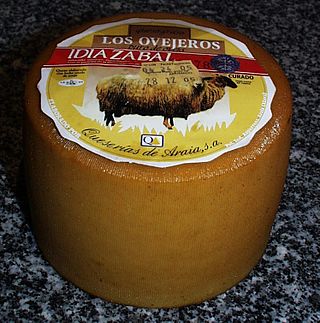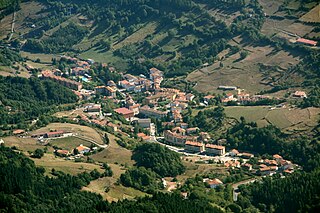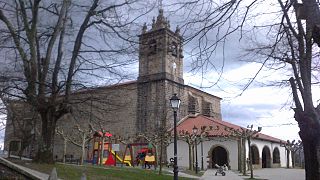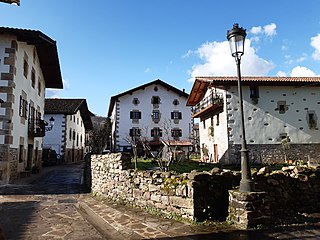
Idiazabal is a pressed cheese made from unpasteurized sheep milk, usually from Latxa and Carranzana sheep in the Basque Country and Navarre regions of Spain. It has a somewhat smokey flavor, but is usually un-smoked.

The Basque Country is the name given to the home of the Basque people. The Basque Country is located in the western Pyrenees, straddling the border between France and Spain on the coast of the Bay of Biscay.

Segura is a small town and municipality in the Goierri region of the province of Gipuzkoa in the autonomous community of the Basque Country in northern Spain.

Akelarre is the Basque term meaning Witches' Sabbath. Akerra means male goat in the Basque language. Witches' sabbaths were envisioned as presided over by a goat.

Zegama, popularly known as "the shadow of Aizkorri", is a town and municipality in the Goierri region of the province of Gipuzkoa, in the autonomous community of the Basque Country, northern Spain.

Gabiria is a town and municipality located in the region of Goierri of the province of Gipuzkoa, in the autonomous community of the Basque Country, northern Spain.

Gaintza is a town and municipality located in the Goierri region of the province of Gipuzkoa, in the autonomous community of the Basque Country, northern Spain.

Itsasondo is a town and municipality located in the Goierri region of the province of Gipuzkoa, in the autonomous community of the Basque Country, northern Spain.

Lazkao is a town and municipality located in the Goierri region of the province of Gipuzkoa, in the Basque Country.

Leintz Gatzaga is a town located in the province of Gipuzkoa, in the Autonomous Community of Basque Country, northern Spain. The municipality's population is 251 (2015).

Olaberria is a town and municipality located in the Goierri region of the province of Gipuzkoa, in the autonomous community of the Basque Country, northern Spain.

Ordizia, formerly known as Villafranca de Ordizia, is a town and municipality located in the Goierri region of the province of Gipuzkoa, in the autonomous community of the Basque Country, northern Spain.

Zuia is a town and municipality located in the province of Álava, in the Basque Country, northern Spain.

Ituren is a town and municipality located in the province and autonomous community of Navarre, northern Spain. Ituren sits on a westernmost outlying area of the Pyrenees, 56.5 km north of Pamplona. It lies on the flood plain of the River Ezkurra, a tributary of the River Bidasoa, in the shadow of the Mendaur mountain which is characterised by the tiny white-washed chapel of La Trinidad, on its summit.

Basque cuisine refers to the cuisine of the Basque Country and includes meats and fish grilled over hot coals, marmitako and lamb stews, cod, Tolosa bean dishes, paprikas from Lekeitio, pintxos, Idiazabal sheep's cheese, txakoli, and Basque cider.

Ossau-Iraty is a Basque cheese made from sheep's milk.

Hernani is a town and municipality located in the province of Gipuzkoa, Basque Autonomous Community, Spain. The town sits on the left bank of the Urumea river. It is located at a distance of 9.2 km from San Sebastián. The municipality of Hernani occupies an area of approximately 40 square kilometres and is bordered by San Sebastián, Astigarraga, Arano, Elduayen, Errenteria, Lasarte-Oria and Urnieta.

Zumarraga is a municipality and industrial town in Gipuzkoa province of the Basque Country autonomous community of northern Spain, approximately 35 miles (56 km) by road southwest of San Sebastián and 10 miles (16 km) northwest of Idiazabal. As of 2018 the municipality had a population of 9834 people. The Urola river flows through the vicinity. It is the birthplace of Miguel López de Legazpi, conquistador who explored the Pacific Islands and the East Indies, and of Iñaki Urdangarín, the husband of Infanta Cristina of Spain.

The Latxa is a breed of domestic sheep native to the Basque Country of Spain. Mostly contained within the provinces of Biscay, Gipuzkoa, Navarre and, Cantabria are dairy sheep whose unpasteurized milk is used to produce Idiazábal and Roncal cheeses. There are two sub-types of the breed, a dark-faced and a blonde.

There are a number of Basque breeds and cultivars. These are domesticated animals that have been bred - or plant species cultivated - for particular traits and features by Basque people in the Basque Country.
























